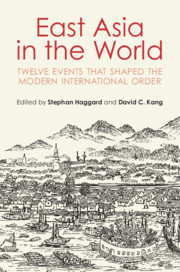Book contents
- East Asia in the World
- East Asia in the World
- Copyright page
- Contents
- Figures and Tables
- Contributors
- Acknowledgments
- Part I Historicizing East Asian International Relations
- Part II The East Asian System over Time
- Part III Contact: East and West
- 9 The Zheng State and the Fall of Dutch Formosa, 1662
- 10 The Opium Wars of 1839–1860
- 11 Matthew Perry in Japan, 1852–1854
- 12 Philippine National Independence, 1898–1904
- 13 The Sino-Japanese War, 1894–1895
- 14 The Death of Eastphalia, 1874
- Conclusion
- Bibliography
- Index
14 - The Death of Eastphalia, 1874
from Part III - Contact: East and West
Published online by Cambridge University Press: 08 October 2020
- East Asia in the World
- East Asia in the World
- Copyright page
- Contents
- Figures and Tables
- Contributors
- Acknowledgments
- Part I Historicizing East Asian International Relations
- Part II The East Asian System over Time
- Part III Contact: East and West
- 9 The Zheng State and the Fall of Dutch Formosa, 1662
- 10 The Opium Wars of 1839–1860
- 11 Matthew Perry in Japan, 1852–1854
- 12 Philippine National Independence, 1898–1904
- 13 The Sino-Japanese War, 1894–1895
- 14 The Death of Eastphalia, 1874
- Conclusion
- Bibliography
- Index
Summary
Few have interrogated the seeming inevitability of the Westphalian or modern system of international relations. The starting point of enquiry for this project is to question our Westphalian reality historically. It locates the birth of the modern international relations system in the death and erasure of its last viable alternative – the East Asian tribute system, which I call Eastphalia. The analytical focal point of this article is a critical case study of the 1875 Un'yō crisis between Japan and Korea. Like many other systemic changes, East Asia’s induction into Westphalian international relations is most legible retrospectively. The kind of “systems encounter” of interest to this chapter comprises a collision between two constitutive sets of interlinked conceptual and legal regimes, institutional apparatuses, and bureaucratic protocol. Often moving at a glacial pace, such systemic changes are not easily visible to a human eye in the midst of unfolding events, partly because our capacities for observation are not calibrated to appreciate changes that occur at such speeds. I consider these frustrated instances of misrecognition as the fricative encounter of two different systems of knowledge and power. I have specifically chosen a confrontation between two East Asian neighbors with a long history of relations, rather than one between an Eastern and a Western entity in order to reveal the Westphalian transition as a systemic harmonization. Such an approach rejects a triumphant modernist narrative of the so-called “West” and Western values over the East.
- Type
- Chapter
- Information
- East Asia in the WorldTwelve Events That Shaped the Modern International Order, pp. 239 - 260Publisher: Cambridge University PressPrint publication year: 2020



